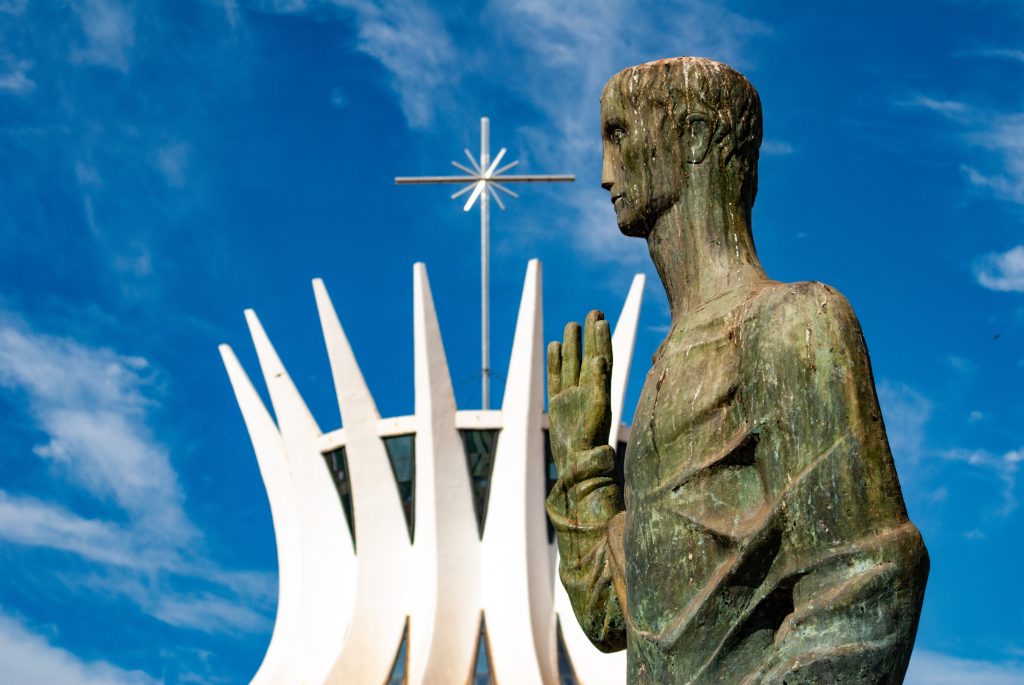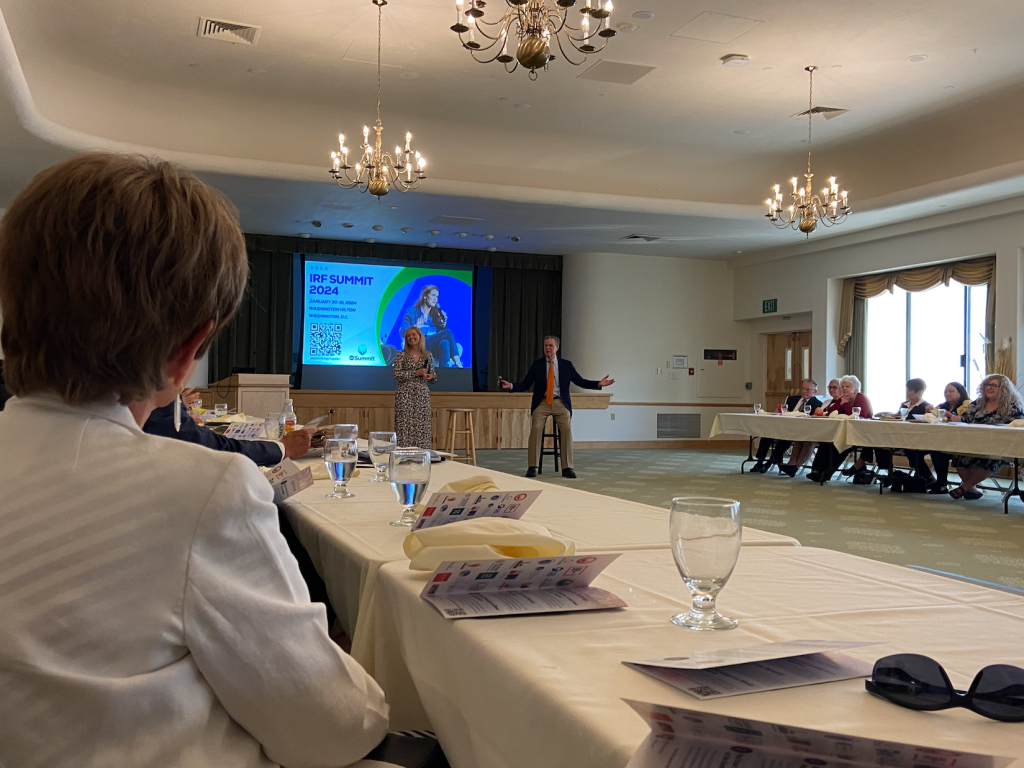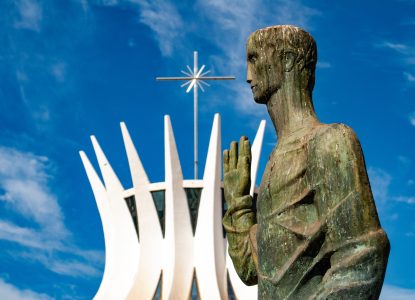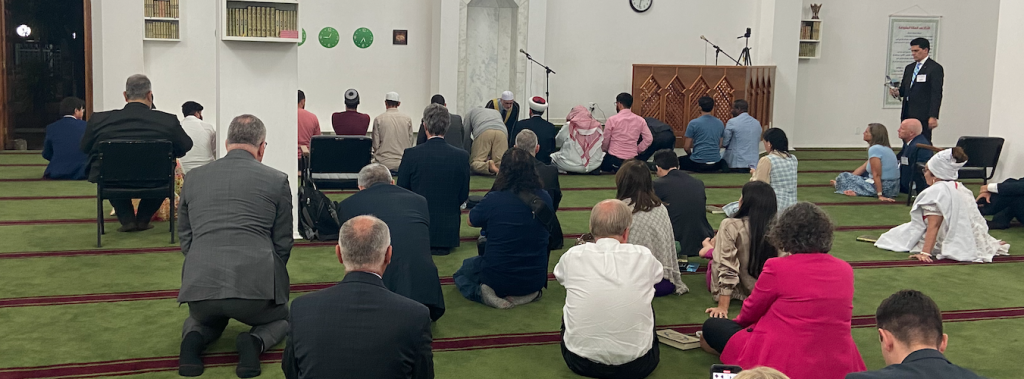By Marianna Richardson, G20 Interfaith Forum Association
– – –
On August 8-10, The International Center for Law and Religious Studies (ICLRS) and Centro Brasileiro de Estudos em Direito e Religião (CEDIRE) held a conference involving religious and civil society leaders from around the world entitled “Building Bridges, Breaking Barriers: The Role of Religious Freedom in Building a Free, Just, and Mutually Supportive Society. The conference, held in Brasilia, Brazil, was especially significant due to Brazil’s upcoming G20 Presidency in 2024. Several delegates from the G20 Interfaith Forum Association were in attendance.

Plenary I – Setting the Stage
The conference commenced with an opening plenary featuring prominent speakers who highlighted the significance of religious freedom as a cornerstone for building a free and just society. Gary Doxey (ICLRS), addressing the audience, emphasized the universal importance of religious freedom, stressing that without it, civil society as a whole is adversely affected. He called for embracing diversity of opinion as an essential ingredient of democracy and asserted that religious freedom is a mechanism that promotes diversity and allows for peaceful coexistence between believers and non-believers.
Rodrigo Alves (CEDIRE), reflecting on partnerships and networking, underscored the value of collaboration, particularly with institutions like ICLRS. He highlighted the central theme of the conference, which is how religious freedom can foster a cooperative society and emphasized the need to take the theme to other organizations and promote a free and fair society.
Marcela Passamani, representing the Brazilian government, acknowledged the urgency of promoting policies that support religious freedom. She expressed the need for political policies to evolve and adapt to changing times, emphasizing that political leadership plays a crucial role in this transformation. The Brazilian government’s commitment to religious freedom, especially in the upcoming presidency of the G20, was highlighted as an opportunity to showcase Brazil’s strength in this area.
Challenges and Concerns
There are pressing global issues related to religious freedom, including the tragedy of genocide, hostilities related to religion, religious terrorism, and government restrictions on religion. The COVID-19 pandemic was discussed, with a focus on the unduly harsh restrictions placed on religious practices. Other international concerns were the rise in anti-Semitism and Islamophobia, attacks on individuals, and taxation on Afro-Brazilian religions were also addressed.
The overarching message was that religious freedom is not just about the immensity and intensity of religious beliefs but rather a necessary solution to conflicts rooted in deeply held religious differences. Religious freedom was presented as the “grandparent of human rights,” and it was argued that other human rights have evolved from social conflicts related to religion.
Three Pillars of Religious Peace
Three pillars of religious peace were proposed:
- First, the idea that religious freedom reduces pressures to coerce religious conformity, fostering a diverse and pluralistic society.
- Second, a robust view of pluralism was discussed, highlighting the importance of neutral and general laws that protect individual rights, even when those rights may conflict with religious beliefs.
- Lastly, the doctrine of religious autonomy was emphasized, promoting self-determination in religious affairs and limiting the state’s intervention in religious communities.
The Role of Religious Communities
Elder Ulisses S. Soares, an apostle of the Church of Jesus Christ of Latter-day Saints, emphasized the importance of religious communities in fostering love, solidarity, and social cohesion. He pointed out that the role of religious communities in preserving traditions, promoting justice, and supporting families is paramount to society. Justice, he argued, comes from the collective actions of a group rather than individuals.
Christine Ale Bastos spoke on behalf of African religions in Brazil and highlighted the importance of respect and understanding between different religious groups. She emphasized the need for religious tolerance and coexistence, stating that no one religion is superior to others.
Luiza Cavalcante represented the Baha’i faith and discussed the capacity of different religious communities to come together and work for the betterment of society. She stressed the importance of unity and cooperation among religious groups to address common challenges and promote humanization.
Ricardo Hoepers, a Catholic Bishop in Brazil, expressed concern about the decline in religious and moral values in society. He highlighted the importance of religious freedom in protecting the rights of individuals and promoting a just world. He called for religious institutions to engage more actively in promoting ethical values and social justice.
The Role of the International Community
Ibrahim Salam, Chief of the Human Rights Treaties Branch of the UN High Commissioner of Human Rights, discussed the challenges and complexities of promoting freedom of religion or belief in the international context. He highlighted issues such as collateral damage, political realities, and conceptual challenges in addressing religious freedom. He stressed the need for a more adaptive narrative that reconciles religious freedom with human rights.
Nazila Ghanea, UN Special Rapporteur for Freedom of Religion or Belief (FoRB), emphasized the need to clarify and recapture agreed-upon grounds for religious freedom. She highlighted the importance of a broad interpretation that includes non-traditional beliefs and interpretations. She also called for greater visibility of violations of religious freedom and discrimination.
Knox Thames, U.S. Institute of Peace, discussed the challenges of addressing religious freedom violations in the context of the global pandemic. He emphasized the need for more countries, including Brazil, to become involved in efforts to combat religious persecution. He highlighted the importance of ethical business practices and supply chain transparency in addressing forced labor.
Juan Navarro Floria, a member of the IF20 Advisory Council, emphasized the role of churches in advocating for religious freedom and the importance of religious communities coming together to promote FoRB for all. He called for greater recognition of religious freedom as a human right and for efforts to educate the media and police on religious freedom issues.

Current Challenges and Practical Approaches
The final day of the conference focused on contemporary challenges and practical approaches to religious freedom. Participants discussed issues such as hate speech, religious expression in public spaces, and the impact of technology on religious freedom, particularly in the metaverse.
Damaris Moura, former state deputy of the legislative assembly of São Paulo, highlighted the importance of religious literacy among policymakers and the need to integrate religious freedom education into school curricula. She also discussed the changing religious landscape in Brazil and the world, with an increasing focus on spirituality.
Katherine Marshall, Vice President of the G20 Interfaith Forum Association, concluded the conference by emphasizing the need for religious literacy, evidence-based approaches to religious engagement, and simplifying dialogue between religious and non-religious communities. She also stressed the importance of addressing issues related to gender, family, and intolerance in the context of religious freedom.
In closing, the conference highlighted the complex challenges and opportunities associated with religious freedom in a diverse and interconnected world. Participants emphasized the need for dialogue, cooperation, and a deeper understanding of the role of religion in promoting human rights and social justice. The conference concluded with a sense of hope and a commitment to building bridges and breaking down barriers in the pursuit of a free, just, and mutually supportive society.
– – –
Marianna Richardson is the Director of Communications for the G20 Interfaith Forum. She is also an adjunct professor at the Marriott School of Business at Brigham Young University.



